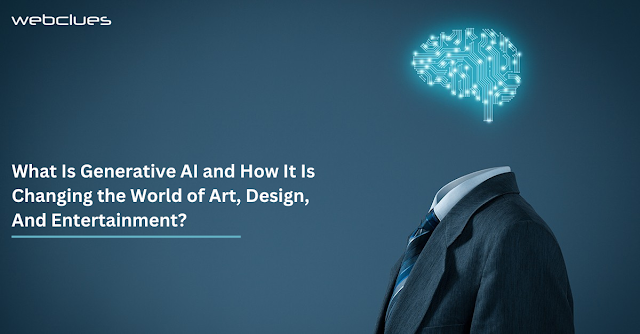Generative AI, a subset of artificial intelligence, has emerged as a transformative force in the realms of art, design, and entertainment. This technology, driven by advanced algorithms and machine learning models, is revolutionizing creative processes by enabling machines to generate novel and often stunning outputs. From creating unique pieces of art to influencing the way designers approach their work, and even shaping the future of entertainment, generative artificial intelligence is leaving an indelible mark on the creative landscape.
At its core, GenAI involves training models on vast datasets to learn patterns, styles, and structures inherent in various types of content. These models can then generate new content autonomously, often with minimal human intervention. In the world of art, this has led to the creation of artworks that blur the lines between man-made and machine-generated, challenging traditional notions of authorship and creativity.
One of the most notable applications of GenAI in art is the creation of unique, AI-generated paintings and sculptures. Artists and programmers collaborate to develop algorithms that can produce visual art based on learned styles or concepts. The resulting pieces can be surreal, abstract, or entirely new styles that human artists might never conceive on their own. This not only expands the possibilities for artistic expression but also raises questions about the role of the artist in a world where machines can contribute meaningfully to the creative process.
In the field of design, GenAI is influencing how products are conceived and developed. Designers can use AI algorithms to assist in the creation of logos, branding elements, and even entire architectural designs. These tools are not meant to replace human designers but rather to augment their capabilities, providing inspiration, generating ideas, and speeding up the iterative design process. The synergy between human creativity and machine-generated suggestions has the potential to yield innovative and groundbreaking designs that may not have been possible otherwise.
Entertainment, too, is undergoing a significant transformation due to generative AI. From scriptwriting to music composition, AI systems are assisting and sometimes leading the creative process. In film and television, for example, AI algorithms can analyze successful scripts and generate new ones based on learned patterns. This not only streamlines the content creation process but also introduces fresh and unexpected ideas that challenge conventional storytelling norms.
In the realm of music, GenAI is becoming a powerful tool for composers and musicians. AI algorithms can analyze vast amounts of musical data to generate original compositions or assist in the creation of harmonies, melodies, and rhythms. This collaborative approach between human musicians and AI systems is giving rise to a new wave of experimental and genre-defying music.
The impact of GenAI is not limited to individual artistic disciplines; it is fostering interdisciplinary collaborations and pushing the boundaries of creativity. Artists, designers, and entertainers are increasingly exploring the potential of combining generative artificial intelligence with other technologies like virtual reality (VR) and augmented reality (AR) to create immersive and interactive experiences.
However, the rise of generative artificial intelligence also brings forth ethical considerations and challenges. Questions about intellectual property, accountability, and the potential for biases in AI-generated content need to be addressed. As GenAI continues to evolve, society must navigate these ethical complexities to ensure responsible and equitable use of this transformative technology.
In conclusion, Generative AI is reshaping the world of art, design, and entertainment by pushing the boundaries of creativity, challenging traditional approaches, and fostering collaboration between humans and machines. As this technology continues to advance, its impact on creative industries will likely deepen, presenting both opportunities and challenges that will shape the future of how we express, experience, and appreciate creativity in the digital age. So why wait? Unlock the future of creativity with WebClues Infotech's advanced GenAI solutions, empowering industries to embrace innovative possibilities and overcome challenges in the digital age.


0 Comments